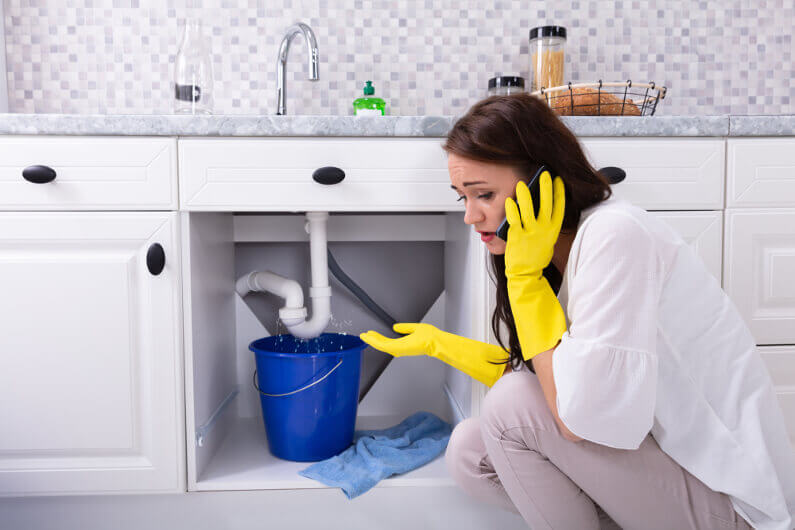It’s best to discover hidden issues before they make themselves known.
“Every house has five major systems that work together to keep it livable”-
The following written content by Jean Feingold
Every time news breaks of a tragic building collapse, you may wonder how safe your own home is. It may seem sturdy, but it’s not an indestructible monolith. Every house has five major systems that work together to keep it livable and each one has its own potential problems that can lead to disaster if left unrepaired.

Look, listen, and sniff for the warning signs below to know whether you need to schedule repairs.
Signs of foundation and structure problems
Your home’s foundation is commonly made of concrete and connects the structure itself to the ground. Above that, the structure, or frame, may be made of concrete, wood, metal, or some combination of those materials. Beneath your feet is the plywood subfloor. Together, these keep your house standing, so it’s crucial to be aware of symptoms of structural issues. Keep an eye out for:
- Visible cracks in the chimney or the house’s exterior
- Windows and doors that stick, don’t open or close smoothly, or won’t lock
- Doors that won’t stay closed
- Cracks in the drywall around sticking doors or windows
- Cracks in vinyl or tile floors
- Long cracks or bowing in basement or crawl space walls
- A new crack in window glass
- Soil pulling away from exterior walls
- Floors sloping to one side or sagging in the center
- Baseboards separating from the wall
- Mold where the roof meets the exterior walls
“Any problems listed here could indicate serious foundation issues putting your home at risk of collapse,” notes Joe Belcher, a code consultant at JDB Code Services Inc. in Homosassa, Florida.
These are not the only signs there could be problems with the foundation or walls, but they are fairly easy to notice. You should look further for stains under your windows, which can mean water is getting in around the frame. H2O can also get into your walls, attic, or basement thanks to rusted, leaky gutters or gaps between gutters and the roof’s edge. Unwanted water can breed mold and rot your home from the inside.

Floors can have hidden issues too. If they feel strangely bouncy or soft, have high and low places, and/or make cracking or popping sounds underfoot, they could be deteriorating—possibly due to a termite infestation or water intrusion. Whatever the cause, weak floors can collapse if left unrepaired.
If you suspect termites, look for other signs, including bubbling or cracked interior paint; small, dry mud tubes on the foundation running from the ground to the exterior finish; and multiple tiny holes in the drywall or wood. Left unchecked, these insects can damage a wood structure so severely that it fails. Hire a licensed exterminator to inspect the house and provide appropriate treatment.
Other structural issues will also require an expert assessment. Should a foundation shift or a foundation wall collapse, a structural engineer will need to inspect the damage. They can determine whether it’s safe for you to stay home during repairs and where stabilizing jacks or beams must be installed before rebuilding can occur.
Electrical issues that can cause fires

The electrical system in your house consists of a breaker box, wiring, switches, and outlets. If you notice any of the following, it may have issues that could lead to fire or electrocution.
- Warm, vibrating, or sparking outlets and switches
- Buzzing, crackling, or sizzling sounds when you flip a switch or stick a plug into an outlet
- Repeated circuit breaker tripping
- Burning or odd odors
- Clothes dryer vents stuffed with lint
In addition to these warning signs, don’t ignore switches or outlets that suddenly stop working or only work occasionally—wiring could be loose. Flickering lights also suggest a possible wiring short.
And pay attention if you smell an unpleasant odor akin to an overheating electrical motor. Sometimes a new appliance smells the first few times it’s used, which is OK. If that’s not the case, you could have melted wiring. Unplug nearby lamps and other appliances and sniff the outlets and switches. If the smell is coming from a specific one, shut off the power at the breaker box and call a licensed electrician to check it out. Don’t try to fix it yourself unless you’re qualified to do so. Botched electrical work can hurt you and your home. Be safe—get help from an expert.
Symptoms of plumbing problems
The pipes in your home bring in fresh water and remove wastewater to the sewage system. They may be located under your floors or in your attic. Read more from Popular Science.





